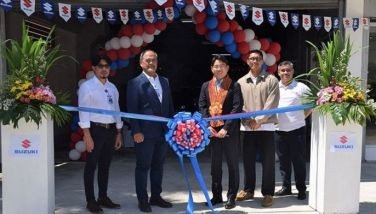Clear

April 20, 2006 | 12:00am
If the people’s initiative were indeed a train, as some have preferred to characterize it, the track ahead seems clear. That is as far as the arena of public opinion is concerned.
Pulse Asia, the Ateneo School of Government and the Philippine Political Science Association held a roundtable discussion last Tuesday on the survey numbers regarding the matter of charter change. Mario Taguiwalo led the discussion, offering his analysis of the survey numbers, decomposing the statistics and cross-tabulating the responses.
The most viable conclusion Taguiwalo arrived at was that public opinion was "conflicted."
Significantly, a greater number of what might be called "anti-GMA" respondents were disposed towards Charter change. Conversely, a greater number of "pro-GMA" respondents were averse to Charter change.
That factor will definitely limit the capacity of either side of the Charter change debate to draw a line that closely follows the "pro-administration" and "opposition" camps.
The dilemma was best expressed by Joel Rocamora of the Institute for Popular Democracy (IPD). He was surprised that in many areas nationwide, Charter change advocates were using the primer on constitutional reform produced by the IPD.
The IPD, at one time, was advocating constitutional change. Aligned with the militant opposition group Akbayan, the IPD is now opposing the people’s initiative. It is therefore inconvenient that the material they produced at a previous political episode is now being used by political forces pushing the people’s initiative.
The urban middle class, which is by and large critical of the present administration is more receptive to constitutional change than the lower-income, more rural groups. These latter groups, generally less critical of the administration, is also more wary of constitutional change.
Much has been said in the media about the fact the two-thirds of survey respondents say that they have "little or no knowledge" of the constitutional issues. But what is truly remarkable is that a third of respondents feel they are sufficiently well informed about the Constitution. That is an impressive number, even by the standards of the mature democracies.
At any rate, the amount of information about constitutional issues does not matter in determining the disposition of respondents towards Charter change. Whether they consider themselves well-informed or under-informed about the Constitution, the distribution of those who favor and those who oppose Charter change remains the same.
Older people tend to be reluctant to experiment with charter change. Younger people are more open to such experimentation.
College graduates are slightly disinclined to support charter change. Those with some amount of college education are slightly inclined to support the effort.
Will a stronger anti-charter change position adopted by the Catholic bishops matter?
Not likely. Whether the respondents think the CBCP has small or big influence, the distribution of dispositions towards Charter change remains the same.
All these things tell us that there are no hardcore constituencies either way in the looming political confrontation between those who support and those who oppose Charter change. The administration, which is inclined to support charter change, must put great effort at convincing its generally pro-status quo constituency. The opposition, likewise, must put great effort at convincing its anti-status quo constituency to resist constitutional renovation.
Between the last Pulse Asia survey and the one preceding it, the proportion of respondents who favored Charter change doubled. In the last survey, those who opposed Charter change enjoyed only a slight advantage – although momentum does not seem to be on this side.
The last survey, it must be pointed out, was taken early March. The popular initiative campaign, and the information drive that accompanies it, began in the latter half of March.
It should be safe to say that public opinion is now divided down the line on this question.
That roughly even division of opinion will not last very long. The local governments are campaigning hard for Charter change. The largest trade union federation, a number of business groups and a large coalition of Protestant groups have joined the popular initiative campaign since the survey was taken.
The fact that the administration, the ruling party and the long-time advocates of Charter change are soliciting support along a broad front gives the popular initiative the advantage of political momentum, a superior organizational effort and resources. The greater likelihood is that the Charter change proposition should gain the upper hand in the survey numbers the next time those numbers are taken.
Since there are no significant hard-core constituencies on either side of the debate, then the voters will likely shift according to the position taken by their political leaders. That probability favors the Charter change effort as well.
Even if public opinion remains evenly divided, neither side can claim any intensity of sentiment nor a high degree of political passion. The coast is clear for the administration to enforce its preference.
There is nothing particularly irregular about that.
Recall that when the great debate on the future of US bases in the country happened in the early nineties, three-fourths of the public preferred the bases stay. The Senate voted to terminate the bases treaty anyway – and public opinion soon followed the momentous decision.
At that time, the courageous decision of the Senate to defy the immense majority in public opinion was called an act of statesmanship. It was not called impetuous, arrogant, tyrannical or anti-democratic. The duty of political leaders is to lead opinion, not bow to it.
The same principle of statesmanship applies to the matter of constitutional reform as well.
Pulse Asia, the Ateneo School of Government and the Philippine Political Science Association held a roundtable discussion last Tuesday on the survey numbers regarding the matter of charter change. Mario Taguiwalo led the discussion, offering his analysis of the survey numbers, decomposing the statistics and cross-tabulating the responses.
The most viable conclusion Taguiwalo arrived at was that public opinion was "conflicted."
Significantly, a greater number of what might be called "anti-GMA" respondents were disposed towards Charter change. Conversely, a greater number of "pro-GMA" respondents were averse to Charter change.
That factor will definitely limit the capacity of either side of the Charter change debate to draw a line that closely follows the "pro-administration" and "opposition" camps.
The dilemma was best expressed by Joel Rocamora of the Institute for Popular Democracy (IPD). He was surprised that in many areas nationwide, Charter change advocates were using the primer on constitutional reform produced by the IPD.
The IPD, at one time, was advocating constitutional change. Aligned with the militant opposition group Akbayan, the IPD is now opposing the people’s initiative. It is therefore inconvenient that the material they produced at a previous political episode is now being used by political forces pushing the people’s initiative.
The urban middle class, which is by and large critical of the present administration is more receptive to constitutional change than the lower-income, more rural groups. These latter groups, generally less critical of the administration, is also more wary of constitutional change.
Much has been said in the media about the fact the two-thirds of survey respondents say that they have "little or no knowledge" of the constitutional issues. But what is truly remarkable is that a third of respondents feel they are sufficiently well informed about the Constitution. That is an impressive number, even by the standards of the mature democracies.
At any rate, the amount of information about constitutional issues does not matter in determining the disposition of respondents towards Charter change. Whether they consider themselves well-informed or under-informed about the Constitution, the distribution of those who favor and those who oppose Charter change remains the same.
Older people tend to be reluctant to experiment with charter change. Younger people are more open to such experimentation.
College graduates are slightly disinclined to support charter change. Those with some amount of college education are slightly inclined to support the effort.
Will a stronger anti-charter change position adopted by the Catholic bishops matter?
Not likely. Whether the respondents think the CBCP has small or big influence, the distribution of dispositions towards Charter change remains the same.
All these things tell us that there are no hardcore constituencies either way in the looming political confrontation between those who support and those who oppose Charter change. The administration, which is inclined to support charter change, must put great effort at convincing its generally pro-status quo constituency. The opposition, likewise, must put great effort at convincing its anti-status quo constituency to resist constitutional renovation.
Between the last Pulse Asia survey and the one preceding it, the proportion of respondents who favored Charter change doubled. In the last survey, those who opposed Charter change enjoyed only a slight advantage – although momentum does not seem to be on this side.
The last survey, it must be pointed out, was taken early March. The popular initiative campaign, and the information drive that accompanies it, began in the latter half of March.
It should be safe to say that public opinion is now divided down the line on this question.
That roughly even division of opinion will not last very long. The local governments are campaigning hard for Charter change. The largest trade union federation, a number of business groups and a large coalition of Protestant groups have joined the popular initiative campaign since the survey was taken.
The fact that the administration, the ruling party and the long-time advocates of Charter change are soliciting support along a broad front gives the popular initiative the advantage of political momentum, a superior organizational effort and resources. The greater likelihood is that the Charter change proposition should gain the upper hand in the survey numbers the next time those numbers are taken.
Since there are no significant hard-core constituencies on either side of the debate, then the voters will likely shift according to the position taken by their political leaders. That probability favors the Charter change effort as well.
Even if public opinion remains evenly divided, neither side can claim any intensity of sentiment nor a high degree of political passion. The coast is clear for the administration to enforce its preference.
There is nothing particularly irregular about that.
Recall that when the great debate on the future of US bases in the country happened in the early nineties, three-fourths of the public preferred the bases stay. The Senate voted to terminate the bases treaty anyway – and public opinion soon followed the momentous decision.
At that time, the courageous decision of the Senate to defy the immense majority in public opinion was called an act of statesmanship. It was not called impetuous, arrogant, tyrannical or anti-democratic. The duty of political leaders is to lead opinion, not bow to it.
The same principle of statesmanship applies to the matter of constitutional reform as well.
BrandSpace Articles
<
>
- Latest
- Trending
Trending
Latest
Trending
Latest
Recommended


















